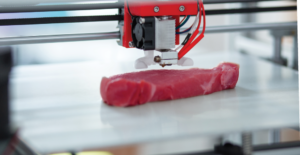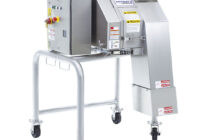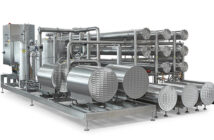
After successfully cultivating meat on the International Space Station, the company now has its sight set on growing steaks on Mars. That’s right – Mars.
Aleph Farms Ltd is a developer of a non-GMO cell-based 3D bioprinting meat platform and the company has recently launched ‘Aleph Zero’, a new project set on taking 3D meat printing to Mars.
The company made headlines when it became the first organisation to produce meat in a 3D bioprinting experiment on the International Space Station, in collaboration with Finless Foods, Russia-based 3D Bioprinting Solutions and others.
Taking food into space has always been a challenge for astronauts, which is why Aleph Zero was created. By producing meat grown in an artificial environment, space explorers could have access to nutritious food no matter where they are.
The beef steaks are cultivated by mimicking cows’ muscle-tissue regeneration. Scientists must isolate stem cells from the animal and then allow them to multiply them in a lab, replicating muscle, fat and tissue.
This can take as little as three weeks to ‘grow’ the same amount of meat as you could get from a beef cow that is 18 months old.
Aleph Farms Ltd recently made headlines again when it began preparing to cultivate thin-cut beef steaks on a mass scale. The pilot plant BioFarm is planned to be launched at the end of 2022.
Co-founder and CEO of Aleph Farms, Didier Toubia says one of the big challenges with cultivating meat is being able to grow large quantities and charge a rate that can compete alongside conventional meat.
“We have developed five technological building blocks unique to Aleph Farms that are put into a large-scale production process, all patented by the company,” he says.
For many meat cultivation companies, replicating conventional meat’s texture, taste and nutritional value is challenging. This means investment in research and development.
In the US, the meat cultivation industry is increasing and there is a lot of consumer interest according to Memphis Meats co-founder Una Valeti.
This could be due to the pandemic disrupting the meat packing plants in America, causing some panic about a potential meat-shortage.
In New Zealand, interest in the meat cultivation industry is also growing, following Fonterra’s announcement that it was investing in US-based bio-engineering food company Motif Ingredients in February last year.
Head of Fonterra’s Global Consumer and Foodservice business, Judith Swales, says the move is part of the co-operative’s commitment to its farmer-owners to keep up to date with the latest innovations and recognise the changing consumer needs.
“Farmers expect their co-op to get the most value from every drop of their milk and keep an eye on tomorrow to future-proof their co-op for generations to come. Dairy nutrition will always be at our core, but we also want to explore how we can capture more value from new types of nutrition.
“The complementary nutrition category – where plant, insect, algae and fermentation-produced nutrition co-exist alongside animal proteins, including cows’ milk – is fast evolving. It’s not a case of either/or, but both,” says Swales.
“If we fast forward 30 years, there’ll be two billion more mouths to feed and there simply won’t be enough food to go around just using today’s methods. A combination of traditional and complementary nutrition sources will be required to meet the world’s increasing need for food, especially protein.”




























































































